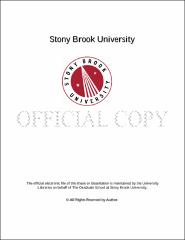| dc.identifier.uri | http://hdl.handle.net/11401/78299 | |
| dcterms.abstract | This dissertation explores the trajectory of the Chilean State’s statistical projects from the mid-eighteenth century to the beginning of the twentieth century. It begins in a moment when the scientific concerns of the Enlightenment dovetailed with the State’s demand for knowledge after the dissolution of the Spanish Empire. It analyzes the construction of a specialized bureaucracy entrusted with the mission of producing the statistical information the Chilean State required for effective government. Due to the relational and spatial implications of producing official numbers, these inquiries opened up permanent spaces of interaction between the central institutions and the administrative peripheries of the State. The creation of a network of provincial bureaucrats responsible for collecting and processing information, by mid-nineteenth century, was a crucial step in the institutionalization of these relationships. The forging of a differentiated bureaucracy existed alongside grey zones that proved the limits of the State’s capacity to produce reliable knowledge. Institutional limitations and conflictive relationships with the people they sought to count proved obstacles to this process. Dramatic territorial and political changes derived from international wars, internal political conflicts, and economic modernization further complicated that scenario toward the end of the nineteenth century. All this rendered the first State statistical project obsolete, giving way to an institutional crisis only solved by means of radical reorganization. This dissertation studies this trajectory, tracing the assimilation of statistics and the territorial anchoring of the State as parallel and correlative processes. Statistics is thus understood not as a “tool” at the service of a State already formed and fully qualified to use it, but a field whose concrete configuration takes place as part of the formation of that very State. In understanding the administrative complexities that conditioned the production of official numbers in Chile over the nineteenth century, this study contributes to elucidating the links between knowledge and bureaucratic organization to the infrastructural power of the State. | |
| dcterms.available | 2020-04-09 | |
| dcterms.contributor | Advisors: Gootenberg, Paul; Roxborough, Ian; Zolov, Eric; Elsey, Brenda | |
| dcterms.creator | Estefane-Jaramillo, Andres | |
| dcterms.date | 2017 | |
| dcterms.dateAccepted | 2018-07-03T17:20:04Z | |
| dcterms.dateSubmitted | 2018-07-03T17:20:04Z | |
| dcterms.description | Department of History | |
| dcterms.extent | 280 pages | |
| dcterms.format | application/pdf | |
| dcterms.identifier | EstefaneJaramillo_grad.sunysb_0771E_13533.pdf | |
| dcterms.identifier | http://hdl.handle.net/11401/78299 | |
| dcterms.issued | 2017-12-01 | |
| dcterms.language | en | |
| dcterms.provenance | Submitted by Jason Torre (fjason.torre@stonybrook.edu) on 2018-07-03T17:20:04Z
No. of bitstreams: 1
EstefaneJaramillo_grad.sunysb_0771E_13533.pdf: 2543693 bytes, checksum: 216a475f99d02bc6a0c63c5d959b2c44 (MD5) | en |
| dcterms.provenance | Made available in DSpace on 2018-07-03T17:20:04Z (GMT). No. of bitstreams: 1
EstefaneJaramillo_grad.sunysb_0771E_13533.pdf: 2543693 bytes, checksum: 216a475f99d02bc6a0c63c5d959b2c44 (MD5)
Previous issue date: 2017-12-01 | en |
| dcterms.publisher | Stony Brook University | |
| dcterms.subject | Latin America—History, Bureaucracy, Chile, History, State formation, Statistics, State knowledge, Territory | |
| dcterms.title | Elusive Numbers. State Knowledge and Bureaucratic Organization in Chile (1750-1911) | |
| dcterms.type | Text | |

